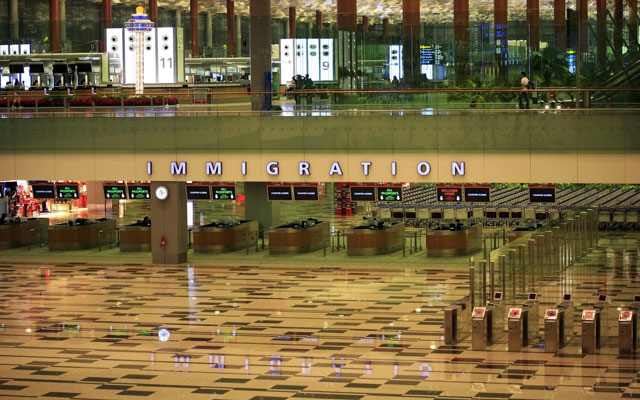Singapore’s move to launch a “fast lane” between the city-state and China to facilitate essential business and official travel between both countries offers a glimmer of hope for travel agents in Singapore.

- Access available only for essential business and official travel
- Layers of approvals as well as health and safety measures in place as safeguards against cross-border transmissions
- Trade desires for “fast lane” to be created for select Asia-Pacific cities too
Singapore’s move to launch a “fast lane” between the city-state and China to facilitate essential business and official travel between both countries offers a glimmer of hope for travel agents in Singapore.
Launching on June 8, 2020, the “fast lane” will be first established between Singapore and six Chinese provinces and municipalities – Shanghai, Tianjin, Chongqing, Guangdong, Jiangsu and Zhejiang – and gradually expanded to other Chinese provinces and municipalities.

As well, both parties have agreed to explore the increase of air links between the two countries for the “fast lane”.
The move comes as Singapore enters phase one of its post-circuit breaker, and moves cautiously to reopen its borders by exploring “fast lane” arrangements with a few other countries, allowing for quarantine-free, cross-border travel to reboot their economies.
China is the first country to establish a green lane with Singapore. With the arrangement, Ker Joo Kheng, general manager of Prime Travel & Tour, said that he is “seeing light at the end of the tunnel”, adding that the move is “essential to reactivate our economy and people’s livelihoods” and will “inject a booster to the aviation sector”.
Agreeing, Simon Er, general manager, business events & marketing, Global Travel, said: “This is a positive step towards reopening of borders for travel, especially business travel as China is a major trading partner of Singapore. It might also form the basis of opening more green lanes with other countries.”
He added: “Opening of green lanes will provide some form of business, especially to corporate travel management companies. As for the aviation industry, we might see more airlines restoring some flights.”
However, Er noted that the move is unlikely to have a major impact on the general tourism industry as it is currently limited to essential business travel.
Martin Zhao, chairman & CEO of Sino Elite Travel Services, which specialises in bringing Chinese delegates to Singapore for conferences and exhibitions, said though the “fast lane” is only limited to essential business travel, the move “heralds a good start” and signals the determination of the two governments to resume exchanges.
Zhao added: “Part of our company’s inbound sales belongs to business travel, and we hope that under this agreement, our related business can be gradually restored.”
Limited and heavily-controlled access
While the travel trade applauds the bilateral pact, the move has drawn sharp criticism among nervous netizens in Singapore who regard the travel bubble with the birthplace of the global pandemic as unwise and “risky”.
Downplaying these concerns, Ker stressed: “I believe the majority will agree that China has contained the virus well and domestic travel is recovering. It’s not an easy decision, but eventually, the border needs to be reopened in order to activate the economy.
“Reasonably, China has progressed with low community infections and imported cases; whether or not it links to the outbreak is no longer important.”
Er echoed that sentiment: “Singapore must have considered all factors and procedures before embarking on opening this green lane with China. One factor could be the ability and speed in formalising procedures and protocols between the two governments to ensure safe passage of travellers.”
On June 3, the Singapore government outlined the necessary safeguards for the Singapore-China “fast lane” to prevent cross-border transmission.
For starters, the company or government agency sponsoring the trip must apply for approval with the local authorities on behalf of the applicant, announced Singapore’s Ministry of Foreign Affairs and Ministry of Trade and Industry in a joint press statement.
Approved applicants from both sides must then apply for a travel visa, if required, and submit their health declaration to the local authorities before arrival at the host country.
Travellers from either country must take a Covid-19 swab test 48 hours before departure, and another upon arrival at their destination, after which they must remain in isolation at specified accommodations for one to two days until the test result is out. They are also required to use the respective country’s contact tracing app for the duration of their stay.
In addition, travellers must adhere to a controlled itinerary for the first 14 days, and may not use public transport, except for private hire cars/taxis or cohorted company transport.
In a Facebook post on Wednesday, Singapore’s foreign minister Vivian Balakrishnan said: “The gradual and safe reopening of our borders will help underpin Singapore’s position as a safe and reliable business, financial and aviation hub for the region.”
Hopes for expanded “fast lane”
To further stimulate the faltering tourist industry, both Ker and Er expressed hopes that Singapore will extend the travel bubble to its regional neighbours.
Said Ker: “South-east Asia and Japan are the top destinations for business travel for many Singapore firms as well as foreign companies. In our case, up to 70 per cent of corporates travelled to these countries.”
Er added: “Singapore should look at (bubbling with) regional countries such as South Korea, Taiwan, Australia, New Zealand and some South-east Asian countries which show promise in managing the pandemic as well as being major trade partners.”
Singapore’s Health Ministry on Wednesday reported 569 new Covid-19 cases, bringing the country’s tally to 36,405. Its death toll stands at 24.



















